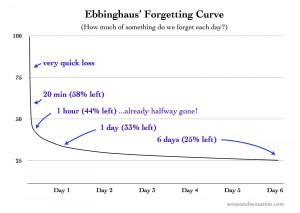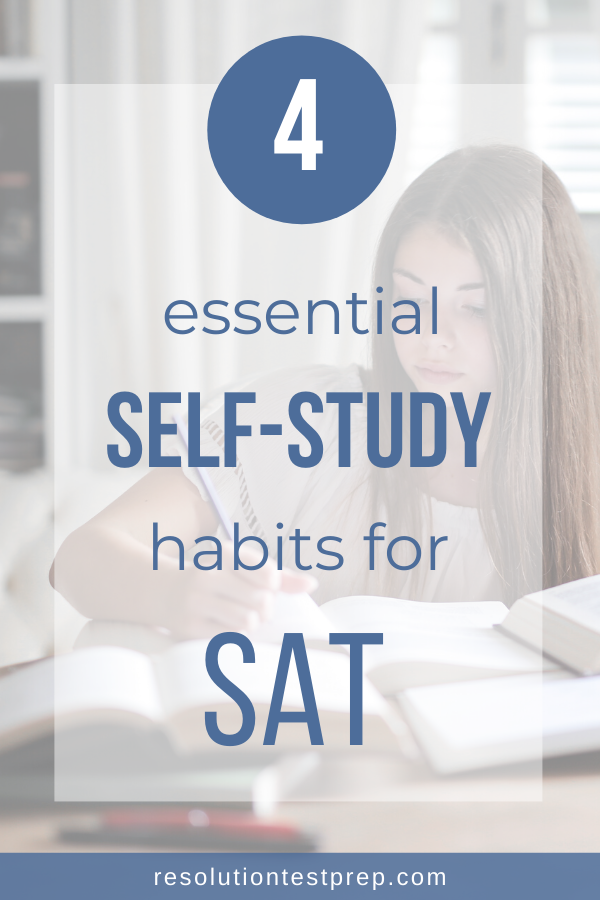Especially with schools out early this year or shifting to online school, a lot of families are choosing to make the most of the situation by getting a jump on SAT or ACT prep. Many are going the route of self-study. But that raises the question of exactly how to go about self-studying effectively. By far the most important thing you’ll need is good ACT/SAT self-study habits. I’ll share with you the most important of these habits below.
Why should you believe me?
I’ve worked with a lot of students shooting for top SAT and ACT scores. In fact, in 2019 alone, I had three students get perfect ACT scores, and several others come very close on both tests. There are always key differences in the ways that high achieving students study. In fact, I can almost predict in advance who is going to make huge gains.
I also run a guided self-study program for SAT and ACT, creating customized study plans for students then checking in with them regularly to provide accountability. I’ve seen students increase their score hundreds of points through carefully designed self-study, but even the best study plan won’t work without the habits below.
Habit 1: Make a study schedule (and stick to it)
Choose a test date that gives you enough time to get adequately prepared and that gives you enough time to get your scores in before applications are due. (Bonus: Choose a date that gives you leeway to postpone or retest if necessary).
Depending on how much time is available, decide whether your ACT or SAT self-study needs to be intensive or whether you can work slowly but steadily on building skills. If you’re not sure, it’s better to be on the safe side by prepping more than you think you need.
Once you have your test date, schedule your study dates in your calendar. Include what you want to accomplish in each session. At first, just label them as Math, Reading, Writing, etc. Make sure the distribution reflects your own strengths and weaknesses, but don’t completely neglect anything, even if you are already scoring 750+ (SAT) or 30+ (ACT) in a section.
About one or two weeks out, start filling in exactly what you want to do in each of these study sessions. For math, are you reviewing linear equations? Quadratics? Or doing timing practice? For reading, are you working on the paired passage? The fiction passage? Timing practice? For writing, you might choose to watch Khan Academy videos on punctuation rules one day and work on passage organization questions another day.
If you’re not sure how you should prioritize or what materials you should use, look into my guided self-study program. I provide study plans customized to your timeline and your own strengths and weaknesses, which can save you lots of time and effort.
Habit 2: Find a study group or an accountability partner
Of course, what good is a study plan if you don’t stick to it? Life happens, so don’t feel bad about adjusting if necessary. But make sure you’re not just letting yourself slack off.
Being accountable to others is a tried and true way to make sure you are following your study plan.
You might choose to make yourself accountable to a study group. If you want to form your own group, find students who are just as motivated as you are. Ideally, they will also be in a similar range of scores, although it’s handy to have a variety of strengths and weaknesses in the group. That way, you can also all reinforce your knowledge by “teaching” your strengths to the group.
If a study group isn’t for you, perhaps an accountability partner would be better. Your accountability partner doesn’t technically even need to be studying for the SAT or ACT! Check in with your accountability partner on a regular basis to share your progress toward your goal and to discuss any times you failed to follow your ACT or SAT self-study plan. Your partner should encourage you and should help you figure out ways to get better about following your plan in the future.
Habit 3: Eliminate distractions
We live in a digital age, and that seeps into SAT and ACT prep as well, for better and often for worse.
Some benefits of technology: Khan Academy videos, SAT or ACT blog posts (like this one!!), online tutors, etc.
Some of the drawbacks: getting distracted by YouTube, Instagram, Snapchat, Netflix, etc.
Let me emphasize this:
It’s impossible to study efficiently if you are constantly looking at your phone, your TV, or whatever other shiny object is competing for your attention.
Your study time should be study time. Not snack time or multi-tasking time. I know you know this. But it’s worth saying.
Habit 4: Don’t neglect review
Somewhere in your ACT or SAT self-study plan, build in time for reviewing topics you haven’t revisited in a while.
A famous psychologist named Hermann Ebbinghaus researched the speed at which we forget things. His findings are depressing, to say the least. When we first learn something, we’ll forget a large part of it within a few days. Within 30 days, nearly everything is gone. He plotted his sad findings as a “forgetting curve.”
So how do we prevent falling victim to the forgetting curve?
One method is to overlearn the material at first. When I was a kid and was learning to play the piano, my dad always told me, “Carrie, don’t practice until you just don’t get it wrong. Practice until you CAN’T get it wrong.” It was super annoying, but basically, he was suggesting I develop mastery so that I would retain the skill longer.
Another method is to review the material repeatedly. Psychologists call this “spaced repetition.” The idea is that when we review, we reset the forgetting curve. Each time we review, we can spend less time doing so. We can also gradually space out the reviews further and further apart.
As a rule of thumb, if you are studying daily, spend one day per week on review. If you are studying less frequently, build review sessions into your plan once or twice a month.
Want a study planner custom-made for test prep? Sign up below to get my free SAT or ACT Test Prep Study Planner.
Need help with your ACT or SAT self-study?
There are a couple of ways I can help:
- If you want to self-prep, but aren’t sure you’ll be able to keep yourself accountable or don’t know if you’d be focusing on the right things, check out my guided self-study program.
- If you aren’t sure whether self-study or tutoring would be right for you, schedule a free consultation call with me here.
- And if you just want more tips and information, follow me on Facebook at Resolution Test Prep.
Whatever you decide, best of luck in getting that great score!
Before you go, pin this:



